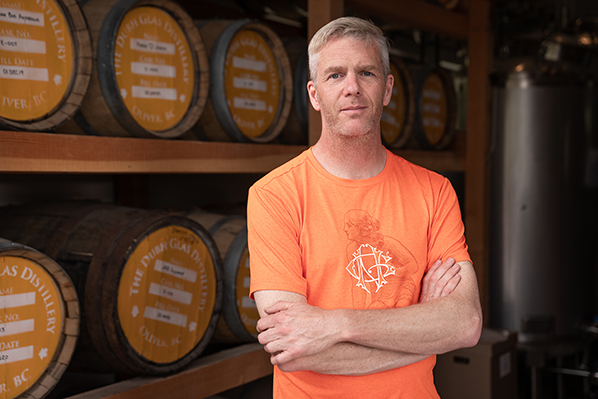REFERRAL PERKS®
Earn $100* for you and your friend for every successful referral.
Learn how an FHSA helps you save for your first home faster.
Learn which savings option is the best for your financial goals.
Explore this step-by-step complete guide to starting a business in British Columbia.
Join webinars hosted by industry experts to enhance your financial knowledge and effectively plan your financial journey.

Years as owner and chief spirits officer of The Dubh Glas Distillery in Oliver, B.C., has taught Grant Stevely to adapt and find creative solutions when problems arise.
When the threat of COVID-19 gained momentum in early March 2020, Grant saw an opportunity to support his business and his community—but he needed to act fast. Hand sanitizer was in short supply in the Okanagan, so Grant pivoted operations away from producing artisan spirits and began distilling for hand sanitizer based on a recipe from the World Health Organization. Within a week Grant was sending the first bottles of Noteworthy Handrub out the door.
It’s the lessons Grant learned through his entrepreneurship journey that helped him adapt so quickly to the changes imposed by COVID-19. We asked Grant to share more about his experiences as a business owner and the learnings he’s picked up along the way.
Valley First: To start, what does small business ownership mean to you?
Grant Stevely: It comes down to problem solving. As a business owner, that’s what we do everyday. Your success is dependent on how good you are at finding solutions. At my business for example, if a piece of equipment breaks down or something doesn’t happen that needs to, how I solve that problem directly relates to the success of my business.
VF: To expand on that, what would you say is the most important quality to have as an entrepreneur?
GS: Resilience. It really comes back to owning the success as well as the failures, and knowing that you’re going to have both everyday, from large to small. It’s also important to surround yourself with good people. If something happens, say an employee makes a mistake, I can’t really be upset with that person. I need to ask myself, ‘Have I trained them properly?’ Their successes and failures are mine as well.
VF: If you could, what advice would you share with your younger self?
GS: If I could go back in time, I’d tell myself to stay on the same path. Everything in my past has contributed to and helped me get to where I am today. What if I started this business earlier? If I had, I don’t think I’d have been as successful. Everything I’ve done in the past has benefitted what I’m doing now.
VF: So, are you saying that this is a carefully plotted path that you’re on?
GS: I wouldn’t say that. I’ve had to adopt to changes. If you look at the business plan I initially wrote, things have changed. As I’ve moved forward in my journey, I’ve listened to my customers and to other businesses. I’ve had to ebb and flow with what I think is going to be successful.
VF: As a credit union, supporting our local communities—including small business—is an important part of what we do. How would you describe the role small business plays in fostering community connectedness?
GS: Well, we can see what’s happening right now because of the ongoing pandemic. Small businesses are supporting each other and want to see shared success. We initially donated a great deal of Noteworthy Handrub before selling it, and much of that donation didn’t just come from us, but from other local businesses. They supplied us with the glycerine and hydrogen peroxide to get that product out in the community quickly.
At The Dubh Glas Distillery we’ve always had great support locally and good partners like Valley First. If it wasn’t for these relationships, we wouldn’t have been able to pivot so quickly.
Hear Grant speak first-hand about how his business adapted to the COVID-19 pandemic in this video.
Everything is easier with a little help.
We acknowledge that we have the privilege of doing business on the traditional and unceded territory of First Nations communities.
© First West Credit Union. All rights reserved.
Proudly Canadian